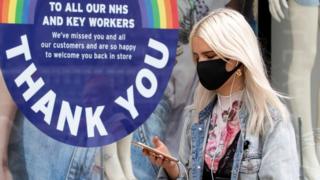 Image copyright
PA Media
Image copyright
PA Media
It is now compulsory to wear a mask in shops and other enclosed public spaces in Northern Ireland.
The decision was taken by ministers last week as part of efforts to suppress coronavirus. Infections in NI have risen three-fold since early July.
Stormont said it wanted enforcement to be light-touch but warned fines of up to £60 were possible.
The Department of Health said it would be an offence to breach the law without having a "reasonable excuse".
Breaches could attract a fixed penalty notice of £60 (reduced to £30 if paid within 14 days), it added.
The amount increases if there are further offences.
First Minister Arlene Foster said the executive would have "failed" in explaining the importance of people wearing face coverings, if the situation arises where fixed penalty tickets are being issued.
Questions remain about how this new legislation will be enforced.
'Individual responsibility'
The PSNI has said the primary responsibility for enforcing the wearing of face coverings will lie with shop owners.
The force said it would "only use enforcement as a last resort, when all other approaches have been unsuccessful".
Retail NI said it would be the "individual responsibility of shoppers to comply" with the new law.
"We hope that shoppers will show understanding and respect to each other and remind them that a significant number of people with a medical condition are exempt from wearing face covers," said its chief executive Glyn Roberts.
"The wearing of face covers will be difficult for some customers, but we must all play our part in reducing the spread of Covid-19 and ensure a second wave is avoided."
"From the start of this crisis we have always said that our main ask of shoppers has been to think of others and be kind," said Aodhán Connolly, director of the Northern Ireland Retail Consortium.
"That has never been more important than it is now.
"We have seen abuse and violence against staff rise and we would ask for the public to remember that our front-line colleagues are doing a great job in tough circumstances."
The executive has launched a public information campaign - Wear one for Everyone - that will be rolled out over the coming weeks to raise awareness of the benefits of face coverings.
DUP MP Sammy Wilson has criticised the move, and said it would "create more obstacles for hard-pressed retailers and sap confidence from many who do not feel comfortable in a mask".
In a statement the executive said that face coverings were a "vital defence in our battle against Covid-19".
"Our citizens have made great sacrifices during this pandemic, staying at home to stop Covid-19 spreading," it said.
"Now that the lockdown has been eased, we must keep following public health advice, whether that be wearing face coverings, maintaining social distancing or washing our hands.
"We need to maintain the collective spirit that got us through the first surge of the virus," it continued.
The statement added that face coverings should increasingly "become the norm" but added that some people cannot wear them and there should be "no stigma attached to anyone in these circumstances".
The executive said businesses would be expected to encourage and promote compliance.
It has been compulsory to wear a face covering on public transport in Northern Ireland since 10 July.
What about schools?
The first groups of students in Northern Ireland are due to return to school next week - but it is not clear whether they will have to wear face coverings.
Last week, Education Minister Peter Weir said the executive was not recommending face coverings for pupils - but NI's Chief Scientific Adviser Prof Ian Young later said he believed it would be of benefit for older children.
In the Republic of Ireland, ministers have recommended that secondary school students and teachers should wear face coverings when a distance of two metres cannot be maintained.